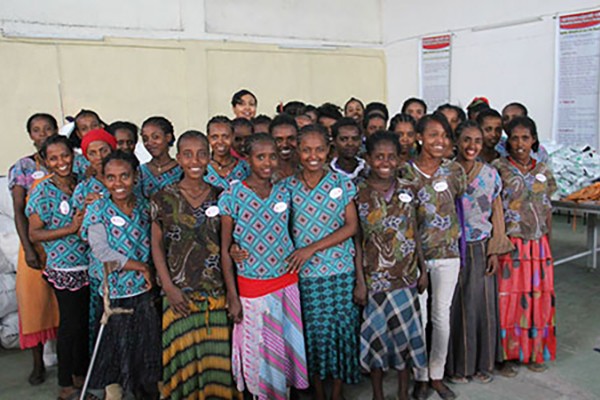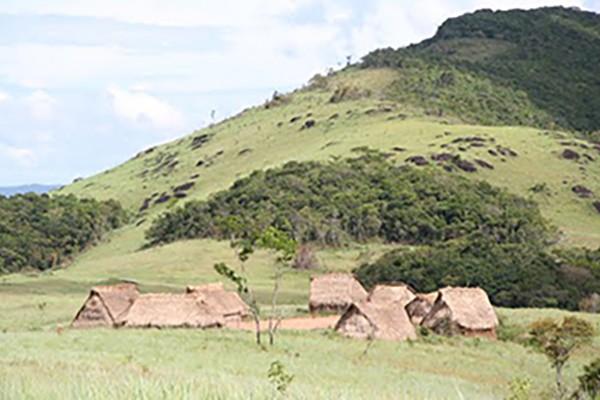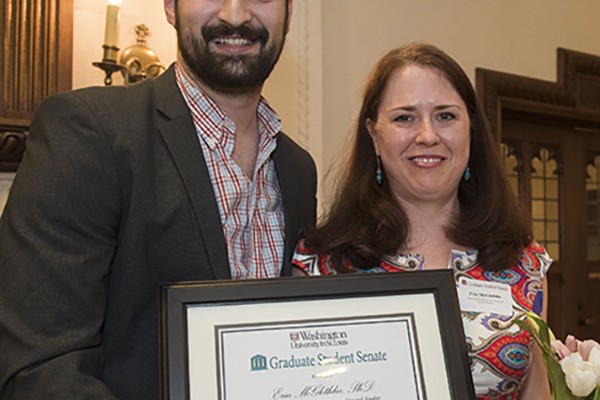Marathon winner Andrea Karl says running makes her a better scientist
Washington University in St. Louis graduate student Andrea Karl found herself thrust into the national spotlight this month at the St. Louis GO! Marathon when an imposter at the finish line denied Karl her first-place accolades. She got to recreate the finish at Busch Stadium. Karl is working towards a PhD in molecular genetics and genomics in the Division of Biology & Biomedical Sciences (DBBS) at the School of Medicine. DBBS is in the Graduate School of Arts & Sciences.
Meyer receives grant for rotator-cuff research
Gretchen Meyer, PhD, an instructor in physical therapy and in neurology at Washington University School of Medicine in St. Louis, has received a $35,000 grant from the university’s Musculoskeletal Research Center for research titled “Promoting Rotator-cuff Muscle Regeneration With Paracrine Adipose Signaling.”
Lewis Wall helps tackle problem of Ethiopian girls lacking sanitary pads
While in Ethiopia as a Fulbright scholar, L. Lewis Wall, MD, DPhil, met a woman who is trying to change the experience of adolescent girls in rural Ethiopia by providing them with reusable sanitary pads and education about menstruation. Wall and his wife, Helen, decided they had to do something to support the mission.
Miles to be Genentech Research Fellow
George E. Miles, MD, PhD, a clinical fellow in molecular genetic pathology, in July will become the first Genentech Research Fellow in the Department of Pathology and Immunology at Washington University School of Medicine in St. Louis.
Finding points to a cause of chronic lung disease
Scientists have long suspected that respiratory viruses play a critical role in the development of chronic lung diseases such as asthma and chronic obstructive pulmonary disease (COPD). Studying mouse and cell models of this process, researchers now have shown how immune cells dispatched to the lung to destroy a respiratory virus can fail to disperse after their job is done, setting off a chain of inflammatory events that leads to long-term lung problems.
Bacterial flora of remote tribespeople carries antibiotic resistance genes
Scientists, including researchers from Washington University School of Medicine, have found antibiotic resistance genes in the bacterial flora of a South American tribe that never before had been exposed to antibiotic drugs. The findings suggest that bacteria in the human body have had the ability to resist antibiotics since long before such drugs were ever used to treat disease.
Graduate students recognize faculty mentors
Erin McGlothlin, PhD (right), associate professor of German and of Jewish studies in Arts & Sciences, was among eight faculty to receive an Outstanding Faculty Mentor Award. She is pictured with one of her graduate students who nominated her for the award, Ervin Malakaj, a PhD candidate in German.
Miller named Clayson Professor of Neurology
Timothy M. Miller, MD, PhD, a leading researcher in the neurodegenerative disorder amyotrophic lateral sclerosis (ALS), has been named the David Clayson Professor of Neurology at the School of Medicine. The professorship was established in 2001 through a bequest from David Clayson, PhD, to support innovative research into treatments for ALS.
Marshall receives grants, named visiting professor in Italy
Garland Marshall, PhD, professor of biochemistry and molecular biophysics and of biomedical engineering, has received a $50,000 grant from the National Institute of General Medical Sciences of the National Institutes of Health (NIH) for research titled “Discovery of New Therapeutics for Drug-Free Remission of HIV,” among other achievements.
Convenience, workplace incentives may increase use of public transit
Transit stops close to home and workplace incentives are associated with higher likelihood that commuters will choose public transportation, according to research from the Brown School at Washington University in St. Louis and Washington University School of Medicine in St. Louis. The study is co-authored by Aaron Hipp, PhD, assistant professor at the Brown School.
View More Stories



